 The relationship between social media, authenticity and reputation often seems abstract. It’s not always easy to predict the outcomes of actions we take and sometimes there are unforeseen negative consequences that take on a life of their own.
The relationship between social media, authenticity and reputation often seems abstract. It’s not always easy to predict the outcomes of actions we take and sometimes there are unforeseen negative consequences that take on a life of their own.
The supermoon was fantastic, right? Most of us saw pictures of it and my fellow Facebookians got glimpses of it in our newsfeeds from all over the world. Being able to see those images instantaneously is what makes social media great.
Almost as instantaneous though are the attempts to post the “best” image – the one that will get lots of likes, shares and comments.
‘Going viral’ is great when it’s authentic. Trying to go viral makes it so we can’t have nice things.
Hey, I get it. It’s very gratifying to win the game. After all, these are the metrics that make people money. Even if your focus isn’t financial, there are other payoffs like wide-spread attention and fame.
We saw an announcement this week that Google and Facebook are taking aim at fake news sites. There’s a lot of conversation around shady information having influenced our political process. The problem isn’t going away and I’m glad to see Google and Facebook taking steps to turn the ship around.
The level of fake, misleading and downright enticing headlines that get people to involuntarily click and share is at fever pitch. We all want to be right about our views so when we see evidence that supports our views, we share it. It’s nothing to be ashamed of, but it is something to be aware of so we can correct our course.
Sometimes it’s just too tempting to see a headline we agree with and share it without vetting it first.
Get my latest business tips, exclusive content, and a bit of fun straight to your inbox with the Kruse Control Newsletter. Boost your profits with our proven advice. Sign up now – it’s free!
A Simple Lesson in Social Media, Authenticity and Reputation
I happened upon a really cool picture in my Facebook newsfeed this morning. It was posted by a page called “Newport Beach, California.” After further inspection, I was alarmed to witness just how easily (and quickly) dubious images and information get disseminated via social media.
Here’s the original Facebook post. It’s been 18 hours (as of this writing) and it’s already got 7,800 likes/reactions, 2,772 shares and 220 comments. Keep in mind, Facebook’s algorithms are set to reward this high level of activity, so this will most likely be seen my more people by virtue of its metrics.
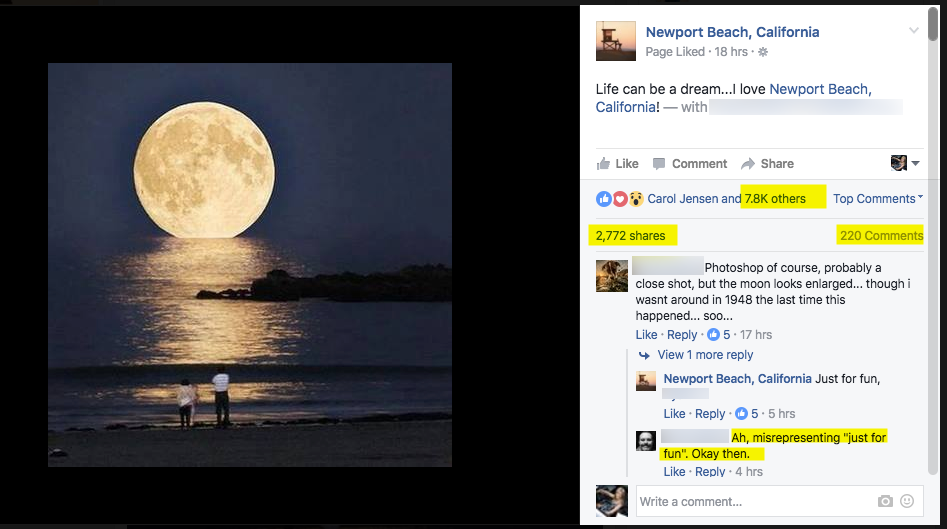
At first glance, this image could be construed as the supermoon in Newport Beach. Wow, awesome, right? But with closer inspection (and as a ‘local’), I felt there was just something fishy about it. It was TOO perfect.
So, I took a deeper dive to see what more I could find out.
Turns out, the image is from 2012, it’s not Newport Beach and it’s been photoshopped. Here’s one comment that begins to bring the image into question:
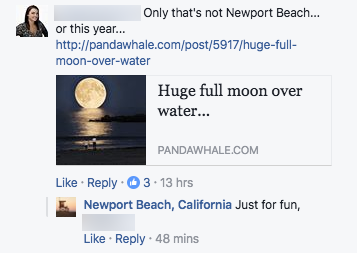
Realizing hours later that users noticed something was awry, the Page Admin, perhaps in an attempt to make it look like it was all part of the plan, began posting “Just for fun.” as a response to every comment.
Hmmm, not a good look.
Then came the onslaught of remarks about the validity of the image (which brings into question the validity of the brand):

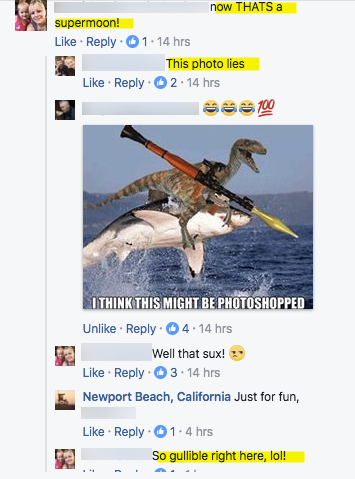
One person even argues that the image is authentic, which then leads someone else to post proof that the image is, in fact, not Newport Beach 2016.
While it’s not the end of the world, nobody likes to feel embarrassed that they’re wrong and I wouldn’t want my brand responsible for that:
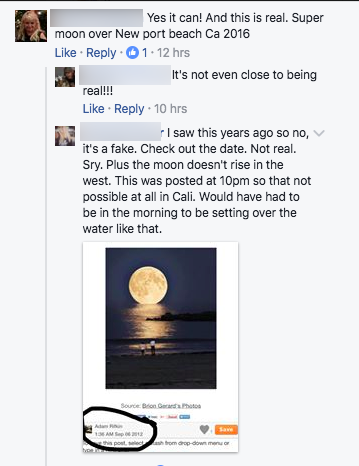
There were a few supermoon pictures that locals took themselves and posted in the comments.
Here’s an opportunity for the brand to redeem some bad feelings and improve brand integrity. They could post the authentic, user-generated photos on the page, tell the story of how it happened and credit the photographer. This one is pretty awesome.
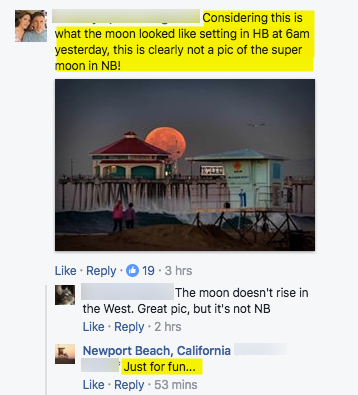
If we lived in a world where only digital metrics mattered, Newport Beach’s Facebook post would be a winner. I actually know people who would say, “Yeah, in the end, it got attention and that increased the page’s visibility.” Ugh. Maybe you know people who would agree. Maybe even you agree.
But is this short-term attention worth the long-term effect on the brand’s reputation?
I don’t want to live in a world where dubious content wins.
The fix for this brand’s predicament would be one of two scenarios:
- Edit the post to just say, “Yes, it’s photoshopped and not really from Newport Beach 2016 but hey, it’s just for fun.”
Or… - Delete the post.
Instead, at least as of this writing, they are responding to every critical comment saying, “It’s just for fun.” This smacks of a lack of skill and/or experience when managing a large Facebook community.
Lack of content strategy leaves brands open to reputation attacks.
The best practice for Newport Beach, California was to not have posted the image at all. Why open yourself up to attacks? Maybe they weren’t aware of the complications but that doesn’t let them off the hook. A quick review of their page shows good intent and with a solid content strategy in place, this mistake could’ve been avoided.
It hurts when unintended negative consequences get dropped in your lap.
You end up being forced to react and that’s not very comfortable. Poor content decisions actually cause people to take the opposite action you intended. In neuromarketing terms, the part of their brain that makes decisions becomes imprinted with a negative perception…and it’s difficult to turn that around.
Implement a content strategy to forge a path to your goals.
Two common goals for social media are to create awareness and increase revenue. Efforts to drive either of these actions are greatly diminished with negative perceptions. Trust, credibility and brand integrity suffer without a clear plan.
Every content decision reflects on the brand’s reputation. It either reinforces or weakens the company’s reputation. The result of poor decisions last far longer than a few hours in the Facebook algorithm.
In conclusion…
Make it a daily task to further examine this relationship between social media, authenticity and reputation. Your content strategy will become more cohesive and your results more rewarding.
